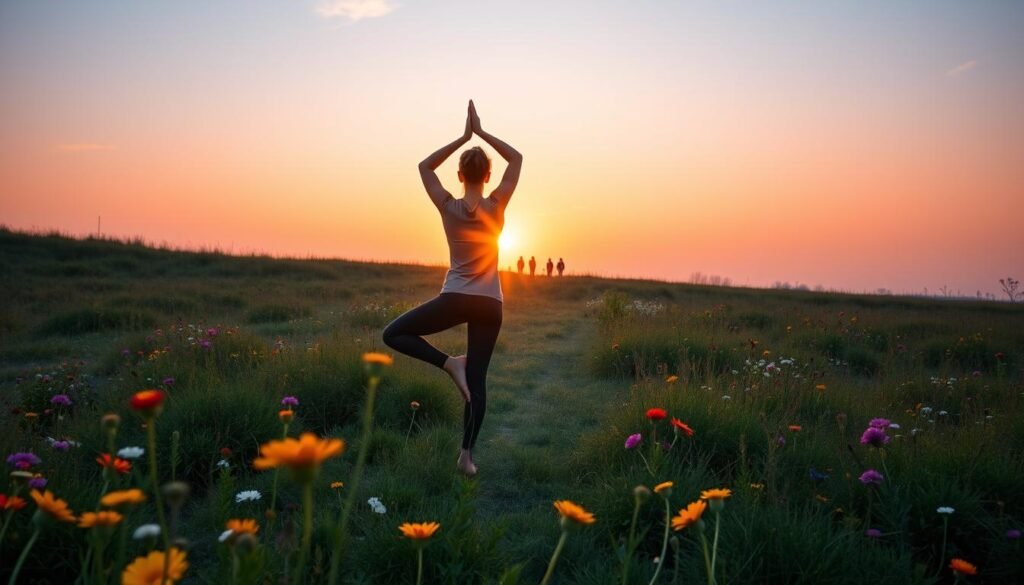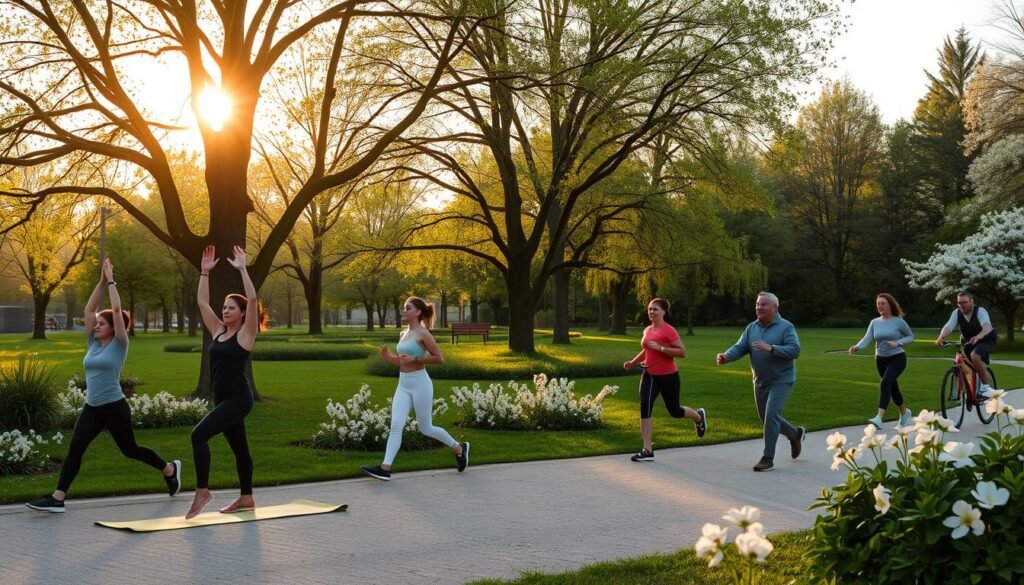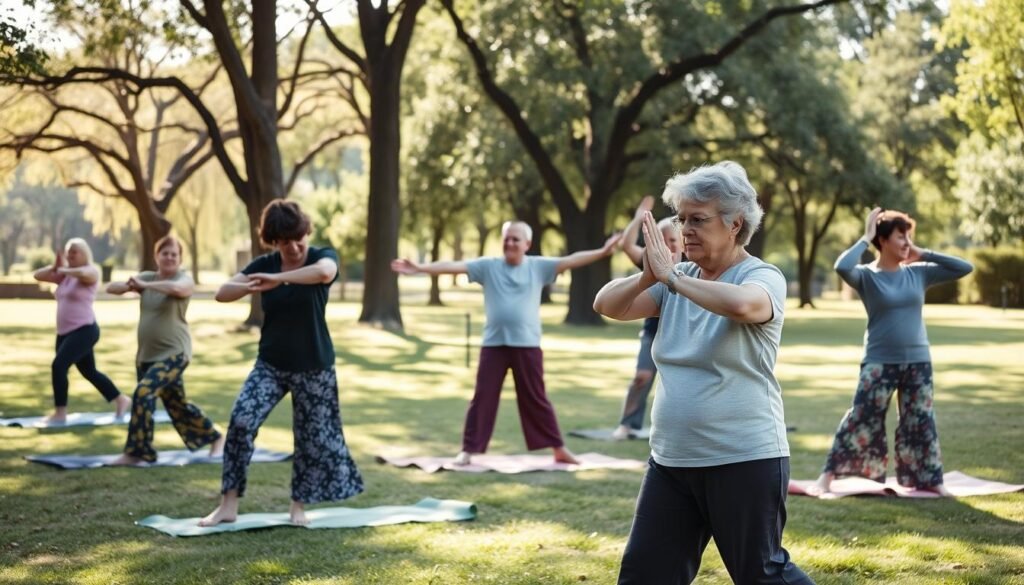A striking fact shows that 15 minutes of running or an hour-long walk daily lowers depression risk by 26%. This finding comes from the Harvard T.H. Chan School of Public Health. It highlights the strong link between physical activity and mental health. Moving regularly can deeply benefit our emotional state. With more than 1 in 5 U.S. adults battling mental illness, the connection between mind and body is essential. Physical activity helps ease symptoms of mental health issues and boosts mood and resilience.
This article will explore how exercise helps mental health, serving as a complementary treatment for mental disorders. It will also cover the positive effects on anxiety and depression management. The bond between our bodies and minds is powerful for improving emotional health. Leading an active life is key to building achievement and self-esteem.
Key Takeaways
- Regular exercise can effectively treat mild to moderate depression, offering a natural alternative to antidepressants.
- Even a short daily routine can lead to substantial mental health benefits, reducing the likelihood of depression relapse.
- Outdoor activities have been shown to alleviate symptoms of PTSD and boost overall mental resilience.
- Consistency in physical activity, whether through weekend sessions or daily routines, leads to significant health improvements.
- Moderate exercise not only enhances energy levels but also builds self-esteem and aids in regulating sleep patterns.
The Importance of Exercise for Mental Health
Exercise is key for better mental health. It boosts well-being and helps fight anxiety and depression. Regular physical activity comes with many perks. These include better memory, improved sleep, and more positivity in life. Even short exercises can make a big difference.
Outdoor activities are great for both your body and mood. They reduce stress by lowering cortisol, the stress hormone. Being in nature can make you more creative and improve your thinking skills.
Exercises like hiking, biking, or swimming are fun and keep your heart and muscles strong. It’s important to protect yourself from the sun and stay hydrated. Start slow with exercise and carefully increase how much you do. Always respect nature by leaving no traces behind.
Doing these activities boosts serotonin, a key chemical for mood and happiness. People who are often in nature are less likely to feel depressed. Nature, exercise, and being outside together do wonders for your mental health.
For more on how outdoor activities boost mental health, check out this resource.
Understanding the Mind-Body Connection
The link between our mind and body is complex. Physical activity is crucial for our mental and emotional health. Studies show that exercise benefits our mental state. For example, the Global State of Mind Index found a significant connection. The John W. Brick Foundation’s review of over 1,000 studies found a big link in 89% of them.
Today, more children and teenagers are feeling depressed and anxious. This is partly because they are less active, a problem made worse by COVID-19. But getting regular exercise can help. Devices like Fitbit or Apple Watch can motivate people. They track activity, heart rates, and sleep to improve mental well-being.
Online platforms like Nike Training Club and Strava provide custom workouts. They help users join fitness communities. Services like Peloton encourage users by offering support and motivation. Practices like yoga and tai chi combine exercise with mental relaxation. They are great for reducing stress and anxiety.
Customized exercise routines do more than improve fitness. They are key for mental health, too. Adding outdoor activities, like hiking, shows how nature boosts mood and brain power. It highlights the powerful link between our surroundings and mental state.
Why Exercise Makes Us Feel Good
Physical activity brings many positive changes to our body and mind. It not only improves our physical health but also our mental state. It does this by changing the levels of certain chemicals in our brain.
These changes make us feel happier and more relaxed, reducing stress effectively. Knowing this shows us the importance of exercise for our emotional well-being.
Neurochemicals and Their Role in Mental Health
When we exercise, our body releases chemicals like endorphins and endocannabinoids. These chemicals make us feel good and happy, boosting our mood naturally. Being active regularly can make these feelings last, helping to reduce anxiety and stress.
By exercising outside, people can feel even better. This is because being in nature increases these benefits, according to studies.
Natural Stress Reduction through Physical Activity
Exercise is a great way to relax and lower stress. It helps release tension in our bodies. This relaxation improves our well-being and stops negative thoughts.
Working out outside is often more fun than indoors. It encourages us to stick with our exercise routine.
Enhancing Cognitive Function with Exercise
Exercise is known to improve our brain functions. It helps with memory, attention, and overall brain performance. Regular activity encourages brain cell growth, boosting our cognitive abilities.
Making exercise a regular habit lets us enjoy these mental benefits too. These changes in our brain go hand in hand with the positive emotional effects.
| Aspect | Benefits |
|---|---|
| Neurochemicals | Elevate mood and promote relaxation |
| Stress Relief | Reduces anxiety and promotes calmness |
| Cognitive Function | Enhances memory and attention span |
| Outdoor Exercise | Increases motivation and enhances enjoyment |
Exercise as a Complementary Treatment for Mental Health Disorders
Exercise is a key complement to treating mental disorders like depression, anxiety, and PTSD. It helps ease symptoms and boosts the effect of traditional treatments, such as therapy and drugs. Adding physical activity and therapy to treatment plans enhances patient results.
Around 31.1% of adults don’t get enough physical activity. This is worrying, especially since many live in cities with few green spaces. Being active outdoors, especially in nature, is linked to better mental health. Outdoor exercise is more beneficial for mental well-being than indoor activities.
Healthcare providers play a crucial role in pointing out the perks of exercise. Studies show that exercise, along with usual treatments, can lower symptoms of anxiety and depression. For instance, doing aerobic exercises regularly can cut the risk of depression by 26%.
Just a brisk 30-minute walk three times a week can enhance mood and self-esteem.
Yoga and other activities reduce anxiety and help with relaxation. Adding these to daily life can encourage lasting changes and a steady exercise routine. A full approach, including physical activity and therapy, significantly improves mental health.
Looking into this topic, experts now see exercise as more than just an extra treatment. Being active supports mental health and boosts overall well-being. It’s crucial for those facing mental health challenges.
Outdoor Activities (Hiking, Cycling) and Their Mental Health Benefits
Hiking and cycling are key for good mental health. These activities make us fit and connect us deeper with nature. They make us feel better, increasing happiness and giving a more positive life view.
Connecting with Nature for Improved Well-being
Time in nature is scientifically good for us. Many people, about 80% of ages 25 to 70, feel happier after being outside. Nature lowers stress hormones and fights anxiety and stress.
Walking in the sun while hiking makes our body produce vitamin D. This is good for our mind and body.
How Adventure Sports Enhance Mental Resilience
Adventure sports push our limits and make us stronger inside. They help us grow, gain confidence, and believe in ourselves. Facing fears and finding new strengths improves our mental health.
Even just 20 to 30 minutes in nature can cut stress a lot. Rock climbing or kayaking help us deal with life’s challenges better. They teach us to handle stress and grow emotionally.
| Activity | Mental Health Benefits |
|---|---|
| Hiking | Reduces symptoms of anxiety and depression, boosts mood, enhances overall well-being |
| Cycling | Improves cardiovascular health, strengthens muscles, elevates mood through endorphin release |
| Adventure Sports | Builds resilience, increases self-esteem, fosters personal growth through challenges |
Outdoor activities like hiking, cycling, and adventure sports boost our mental health. Engaging with nature leads to great psychological benefits. This creates a path to a healthier mind and life.
The Role of Exercise in Reducing Symptoms of Depression
Exercise is key in tackling depression’s challenges. It helps with sadness, loss of interest, and focus issues. Studies show that staying active can greatly improve mental health, making it a powerful treatment for depression.
Research Supporting Exercise as an Effective Treatment
Many studies prove that exercise helps fight depression. It boosts serotonin and endorphins, which improve mood and lower stress. This shows how crucial physical activity is for feeling better.
Exercise can match the power of antidepressants. It boosts brain health and fights inflammation. By lowering harmful cytokines, it supports mental wellness. This makes regular workouts a smart choice for managing depression.
Mental gains from exercise include better self-esteem and pride in one’s achievements. Activities like aerobics, lifting weights, or yoga can enhance emotional health. They offer a broad strategy for overcoming depression.
Exercise does more than lift spirits; it builds endurance, fights tiredness, and turns attention from negative to positive thoughts. Adding physical activity into a treatment plan unlocks its benefits against depression.

Managing Anxiety through Physical Activity
Physical activity is a natural way to fight anxiety. It provides several benefits for mental health. Doing anxiety relief exercise like running, cycling, or brisk walking can lessen anxiety symptoms in just 20-30 minutes. These activities offer a mental break from worry, helping individuals focus better.
Being outdoors, especially in green areas like parks, reduces stress. Connection with nature boosts mindfulness and uplifts mood. Studies show regular exercise creates a helpful routine for physical activity for anxiety management. This consistency helps build defense against anxiety, giving people tools to handle their symptoms.
Strength training boosts both physical and mental strength. Activities such as weightlifting, yoga, and Pilates demand focus and stamina. They help release endorphins, which improve mood. Mixing cardio and strength exercises is a good strategy for mental health. Gentle exercises like walking, yoga, swimming, and dancing relax the body and lower stress hormones, making them great for everyone.
Exercising regularly enhances brain functions like planning, organizing, and remembering. Improvements in brain health occur. Working with health experts and therapists can tailor exercise plans to fight anxiety. For more tips, visit this resource for more ways to manage anxiety.
Adding anxiety relief exercise to daily life, along with therapy and social support, offers a complete solution for anxiety. Supportive communities boost mental health, offering different types of support and reducing feelings of loneliness that often come with anxiety disorders. For more on support systems, see this guide.
Strategies for Making Exercise a Habit
Creating a consistent exercise routine can be tough. Key strategies include setting clear goals, seeking support, and finding fun activities. It’s noted that building a new habit can take around 66 days. But this period can vary from 18 to 254 days, based on the person.
Beginning with small steps is vital. Just five minutes of exercise can boost mood and energy by releasing dopamine and serotonin. These small starts are big in forming an exercise habit. Being regular with it and choosing activities you love help in sticking to it.

Combining a new exercise habit with an existing one makes it easier to remember. It’s important to set realistic goals. This includes a weekly plan and higher targets. Even short activities, like 5 or 10 minutes, can improve mental, physical, and emotional health.
- Exercising with friends or family boosts motivation.
- Money rewards can also encourage sticking to routines.
- Walking or playing with pets increases daily exercise.
Being kind to yourself helps bounce back from slip-ups. Rewards after exercise motivate continued effort. Your exercise should fit your likes, how hard you can go, and your regular life. This way, keeping up becomes easier.
Finding Enjoyable Outdoor Activities for Long-Term Engagement
Enjoying outdoor activities is key for those wanting to stay fit for the long haul. Taking time to try different activities not only boosts your physical health but also helps you feel better emotionally. Activities like hiking, camping, or outdoor yoga connect you with nature and keep you fit.
Hiking is a great example. It gets your heart rate up and works out many muscles. It’s good for your heart and helps you manage your weight. Plus, hiking reduces stress, boosts creativity and focus, and helps you be more mindful. All these benefits make it a fun way to keep up with fitness goals.
Camping is also a great way to enjoy the outdoors. It lets you unplug from technology and appreciate simple living. This increases gratitude and connection with nature. Camping with others means building friendships and facing outdoor challenges together.
Outdoor yoga is very beneficial too. It helps you get in tune with nature. You become more flexible and strong, and it clears your mind. Doing yoga in beautiful places with others fosters a community feeling, encouraging you to stick with it.
Then there’s walking, the simplest outdoor activity. It’s good for your heart and helps with weight control. Walking lets you enjoy the beauty around you while improving your health.
Getting into these outdoor activities can help you stay engaged in fitness long-term. By focusing on the joy and rewards of outdoor exercise, you can start to love being active. This leads to healthy lifestyle changes that last.
Adapting Exercise for Individuals with Chronic Conditions
Exercise is key to managing chronic conditions. It’s important to create fitness plans that consider individual challenges. These plans help improve well-being. Choosing low-impact exercises, like walking or swimming, is great. They allow people to stay active without worsening their symptoms.
Spending time exercising outdoors is beneficial. It enhances both physical and mental health. Being outside means more vitamin D and increased serotonin levels, making us feel happier. It also can reduce stress by lowering cortisol levels.
Don’t forget about strength training in your fitness plan. It’s critical for fighting muscle loss and keeping up strength as we age. Progressive resistance training counters sarcopenia, a muscle-wasting condition. Biking hard helps with stamina and leg power. It also keeps routines flexible.
Adding mindfulness to workouts brings extra benefits. It lowers stress and makes us mentally tougher. This helps people deal better with the ups and downs of life.
| Exercise Type | Benefits | Importance for Chronic Conditions |
|---|---|---|
| Low-Impact Activities | Safe participation with reduced risk of pain | Encourages engagement without fear of injury |
| Outdoor Exercise | Boosts mood and lowers stress | Combats symptoms of depression and anxiety |
| Progressive Resistance Training | Prevents muscle loss and builds strength | Crucial for maintaining independence and functionality |
| Mindfulness Techniques | Enhances resilience and reduces stress levels | Improves mental health and coping strategies |

Building a Supportive Environment for Fitness Enthusiasts
Creating a supportive fitness environment is key for active lifestyle lovers. It’s great to be around people who share your goals. This support really helps stay on track with health, especially when life gets busy.
Group workouts and fitness classes can make exercising more fun. They’re a good way to make new friends too. Fitness clubs often hold events to celebrate everyone’s achievements. These events make it easier to keep going and aim higher.
Benefits of a supportive fitness environment include:
- Encouragement: Positive feedback from peers keeps you motivated.
- Social Interaction: Connecting with others fosters a sense of community.
- Goal Setting: Setting goals together helps everyone stay on track.
- Healthy Competition: A little competition adds fun to working out.
Outdoor activities offer a special way to foster support while enjoying the great outdoors. Going hiking, biking, or on other adventures helps bond with nature and each other. These activities improve physical fitness and mental well-being by reducing stress and uplifting mood.
| Activity | Benefits | Community Examples |
|---|---|---|
| Hiking | Improves cardiovascular health, promotes relaxation, engages muscles | Bushwalking NSW, Melbourne Bushwalkers |
| Trail Running | Enhances stamina, strengthens core, boosts mental clarity | Sydney Trail Running Series, Brisbane Bushwalkers Club |
| Biking | Versatile workouts, strengthens lower body, low-impact benefits | Bicycle Network, AusCycling |
In summary, a supportive fitness environment boosts the benefits of exercise. By building connections and participating in group activities, people can have a more meaningful path to their health goals.
Conclusion
Exercise does more than just make you fit. It plays a big role in making your mind healthier too. When you work out regularly, especially outdoors, you feel happier. This is because exercise cuts down stress and helps with anxiety and depression. It also builds up your strength and how you feel about yourself by being with others in nature.
It’s key to do outdoor activities like hiking, biking, and climbing. A huge study with over 17,500 reports shows these hobbies boost your mood. They also help your brain work better and increase how well you connect with others. All this leads to a more fulfilling and healthy way of living.
So, the message is simple: exercise can truly change your life. It’s great for your mental well-being. Get outside, mingle with nature, and enjoy an active lifestyle. Make being active a habit that sticks. You’ll see many benefits for your mind and body.